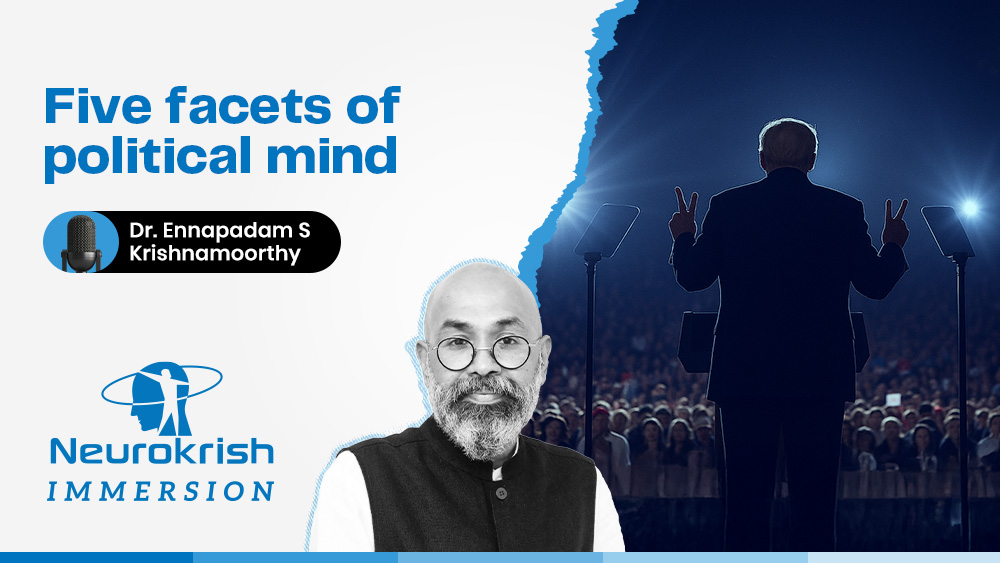Welcome to Neurokrish Immersion. In this podcast, we explore an important and often under-examined area of human behavior: the psychology behind political thinking. What we believe politically is not just a matter of opinion or policy preference. It’s rooted in deeper psychological frameworks that span cognition, emotion, social identity, morality, and power. This episode introduces listeners to what we call the five facets of the political mind.
We begin by acknowledging a reality: most people consume political news, form beliefs, and engage in political discourse even though few will ever run for office or participate formally in politics. This means politics matters in a way that goes beyond governance. It shapes identity and human interaction. Politics infiltrates conversations at dinner tables, classrooms, workplaces, and digital platforms. But why does it command such power over our minds? Why does it provoke such intense emotion, division, and loyalty?
Let’s explore the five psychological dimensions that help explain this:
1. The Cognitive Mind
Our brains are hardwired to prefer cognitive shortcuts, which often manifests as biases. Among the most significant is confirmation bias: the tendency to favor information that aligns with our existing beliefs. We also see the backfire effect, where contrary evidence only reinforces pre-held views, and the Dunning-Kruger effect, where the least knowledgeable individuals overestimate their competence.
Neurological studies show that liberals and conservatives may process information differently. Liberals tend to have a more active anterior cingulate cortex, associated with detecting conflict and promoting cognitive flexibility. Conservatives tend to have a more active amygdala, linked to emotional responses and threat sensitivity. These predispositions help explain the persistence of ideological divides. Our mental architecture is not neutral; it is colored by how we perceive risk, novelty, and complexity.
2. The Emotional Mind
Politics isn’t just about logic. It’s about feelings. Emotions like fear, anger, and hope are powerful forces that influence public opinion and political behavior. Fear-based messaging has long been used in campaign ads and political rhetoric. Hope can galvanize movements, as seen in Barack Obama’s 2008 “Yes We Can” campaign. Anger has fueled populist movements and mass protests worldwide. Emotional language triggers the amygdala, making such messages stickier and more persuasive.
Kahneman’s work in behavioral economics explains how emotionally charged words tap into instinctive thinking patterns, bypassing rational analysis. These messages resonate quickly and linger longer in memory. Emotional resonance is a tool of persuasion that politicians and media outlets have mastered. When debates become emotionally driven, logic often takes a backseat, and compromise becomes difficult.
3. The Social Mind
We are inherently social beings, and politics often reflects tribal affiliations. Identity-based politics is increasingly dominant across the world. Neuroscience shows that group identity activates reward centers in the brain. Oxytocin and mirror neurons promote bonding with in-groups and distrust toward out-groups. This explains phenomena like echo chambers and ideological polarization. Tribalism, once necessary for survival, now manifests in political affiliation and often leads to rigid group loyalties.
Group identity creates a sense of safety, certainty, and belonging. But when threatened, it can foster hostility and exclusion. Social media algorithms exacerbate tribalism by creating filter bubbles, where users are surrounded by like-minded opinions. Over time, this reinforces in-group loyalty and out-group bias. Politics becomes less about issues and more about identity affirmation.
4. The Moral Mind
Our moral frameworks heavily influence political ideology. According to the Moral Foundations Theory, liberals prioritize care and fairness, while conservatives value loyalty, authority, and sanctity. Interestingly, recent studies suggest that political ideology may actually shape our moral values more than the reverse. This inversion helps explain why moral debates on topics like justice, freedom, and rights can be so deeply polarizing. People see these values through different ideological lenses.
This reorientation shows that our political alignment can precede and even dictate how we interpret moral questions. Thus, the debates about abortion, gun rights, immigration, or welfare are not just policy disagreements. They reflect fundamentally different moral universes. Language like “freedom,” “rights,” “justice,” and “patriotism” means different things depending on your political and moral framework.
5. The Power Mind
Power is central to politics. It can be coercive or persuasive, structural or interpersonal. French and Raven’s classic theory outlines six bases of power: coercive, reward, legitimate, referent, expert, and informational. Political actors deploy these forms of power in varied ways: from Gandhi’s moral authority to authoritarian control by leaders like Putin or Xi Jinping. The media also plays a major role in constructing and disseminating narratives of power, influencing public opinion and legitimizing authority.
Power is not just about who governs. It’s about how influence is shaped, how narratives are spun, and how legitimacy is constructed. The digital era has introduced new forms of power through data surveillance, algorithmic control, and social engineering. From soft power to hard power, the modalities through which political actors engage with the masses have multiplied.
So, what do we take away from this exploration? Politics is deeply embedded in how we think, feel, belong, judge, and assert control. It is a psychological ecosystem shaped by identity, emotion, belief systems, and group behavior. Social media, with its algorithms and amplification models, often intensifies these forces, accelerating polarization.
To understand our political minds is to take the first step toward healthier political dialogue. We may not escape bias, but we can become more aware of it. By understanding the psychological machinery behind political thinking, we can engage more thoughtfully and less reactively. Education, dialogue, and empathy must replace outrage and oversimplification.
Let me leave you with a question: What shapes your politics: logic or identity? Let that question sit with you as you reflect on your own views and engage in conversations that matter.
Share this post
